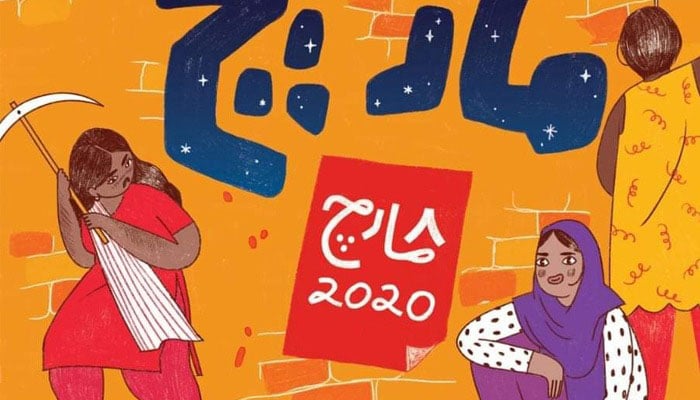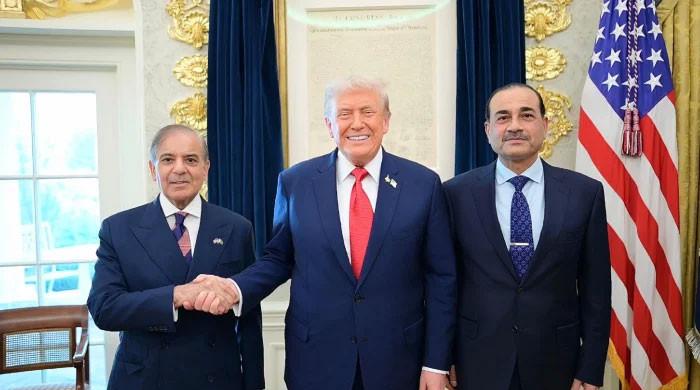Referring to religion, culture, Islamabad High Court tells us why Aurat March is necessary
When flagrant violations of God-given rights are rampant, Aurat March should serve as a moment for introspection: IHC
March 06, 2020

The Islamabad High Court’s decision to dismiss a petition against Aurat March slogans — filed by a complainant who apparently believes raising one's voice for women’s rights spreads ‘indecency’ in society — is a much-needed example of wisdom shining brighter than crass, populist bigotry.
In his eight-page verdict, Justice Athar Minallah, with admirable clarity of thought, holds up a mirror to the misogynists in our midst to show them the hypocrisy behind their moral outrage over Aurat March.
He makes a strong point with references to our religious past, which, the judge demonstrates, offer us the most recognisable example of the struggle for women’s rights being ingrained in our cultural history.
Reminding the petitioners of the role of Islam in advancing women’s rights, Justice Minallah writes: “Fourteen centuries ago, the Holy Prophet Muhammad (Peace Be Upon Him) spread the message of Almighty God. It was a revolution, which has no parallel in human history. It was a message of peace and a revolution, whereby a human being was declared as the Vicegerent of the Creator on earth. It declared humans as a creation in the ‘best of forms’ (Al Isra; 70).”
“The weak, vulnerable and subjugated were the biggest beneficiaries of this unprecedented revolution. It was an era when female infanticide was rampant and an acceptable norm of the society. Women were treated as chattel, having no rights at all. The pre-Islamic times did not recognize any rights of the women.
“The patriarchal culture subjugated and treated women as property. The advent of Islam prohibited female infanticide and gave a woman her own identity. It recognized the right of a woman to enter into a marriage contract based on her free will.
“For the first time women were given the right to inherit property and to own and manage it on their own. They were given the right to engage in business and their education was declared an obligation of the State.
“Women were, therefore, given real empowerment centuries before such rights could be enjoyed in other territories.
“All this was happening at a time when the rest of humanity was treating women as an object and as property, having no rights whatsoever. It was indeed a revolution against the patriarchal and misogynist norms and culture,” he writes.
He recalls asking the petitioner if they really believe that our society follows any of these Islamic values.
“The learned counsels for the petitioners were asked whether the above Islamic injunctions […] were being followed and implemented in our society today, and if not, then why any expressive conduct on the International Women’s Day may not be interpreted as a demand for those rights given to women by Almighty God?”
He drives the point deeper: “They were asked whether it was not a norm of our society to generally not welcome the birth of a female child?
“They did not deny the flagrant violations of the commands of Almighty God,” he notes.
Justice Minallah then pulls the veil off the actual state of affairs of women’s rights in Pakistan.
“The Courts across the country are inundated with litigation brought by women against the denial of their inheritance rights. Mothers, sisters and daughters are denied their rights which have been expressly given to them by Almighty God in unambiguous terms in the Holy Quran. In defiance of the explicit commands of Islam, child marriage, rape and honour killings are not uncommon in our society today.
“Women are forced into marriage against their will. Heinous traditions of Karokari, Swara, Wani and other forms of exploitation are being practiced in a State where 97% of the population professes to be Muslim.
“The tribal and other societal norms seem to have taken precedence over the Islamic injunctions. Female children are not safe and there cannot be a more offensive illustration than the unimaginable pain and agony suffered by the little innocent Zainab.
“The alarming aspect is that there is no outrage against the practices and mindsets, which are a blatant violation of the unambiguous injunctions of Islam.
"The practices and attitudes highlighted above are prevalent in our society and are public knowledge. Evidence of these practices are the female victims whose heartrending stories are heard by the Courts across the country on a daily basis.”
In his most powerful observation against the present state of affairs, Justice Minallah writes: “These norms are not only offensive, but blasphemous.”
He then calls out the petitioners and the general society which is against the celebration of Aurat March for their dual standards.
“The petitioners and the society should demonstrably show their abhorrence and outrage against the norms of certain sections of our society, which are in defiance to the Islamic injunctions, some of which have been discussed above,” he writes.
“There is a need to accept the reality and to change mindsets by demonstrably showing outrage against the flagrant violations of the commands of Almighty God,” Justice Minallah observes.
“As noted above, the International Women’s Day should be taken as an opportunity to introspect. As a society we should be asking ourselves whether Islamic injunctions regarding the rights of women are being respected and followed by all those who claim to be Muslim?
"It is an opportunity for society to stand up and show outrage against the inhuman traditions and mindsets which are in flagrant violation of the injunctions of Islam."
The court then dispenses this advice to both the supporters and critics of the Aurat March:
“This Court expects that the proponents of the Aurat March will exercise their constitutional rights in accordance with law having regard to conduct that is consistent with the norms of decency. It is an opportunity for them to prove those who doubt their intentions wrong.
“The [critics] […] are expected to take this as an opportunity to introspect and demonstrably show outrage against the practices which are flagrantly offensive to the injunctions of Islam, for example: mindsets that do not welcome the birth of a female child, honour killings, rape, practices such as Wani, Swara, Karokari, etc.
“If this happens, then many innocent Zainabs will be saved from being treated savagely," he writes in conclusion.









